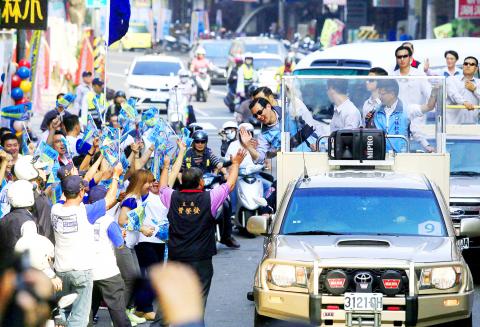President Ma Ying-jeou (馬英九), who doubles as the chairman of the Chinese Nationalist Party (KMT), yesterday made final appeals on behalf of his parties’ candidates on the eve of today’s elections.
Ma spent his day making his way from the country’s south to the north, ending up in Taipei.
At stake are mayorships or county commissioner positions in all 22 of the nation’s cities and counties.

Photo: CNA
The KMT currently controls 15 of those administrative districts, while the Democratic Progressive Party (DPP) holds six and one is led by an independent.
However, dissatisfaction with the Ma administration has put two places especially at risk — the capital, Taipei, which has been in KMT hands since late 1998, and the central city of Taichung, which KMT incumbent Jason Hu (胡志強) has led since late 2001.
Ma started his final day of campaigning in Pingtung County at a rally for the KMT’s county commissioner candidate, Chien Tai-lang (簡太郎).
Ma then traveled to Kaohsiung and Tainan to accompany mayoral candidates Yang Chiu-hsing (楊秋興) and Huang Hsiu-shuang (黃秀霜) in canvassing for votes.
It was the fourth time in a week that Ma visited Tainan to solicit support for Huang in a city that has been in DPP hands since late 1993 and is considered rock-solid green, the color associated with the DPP.
Ma then traveled straight to Keelung to campaign for KMT candidate Hsieh Li-kung (謝立功), before heading to Taoyuan to lend support to incumbent Taoyuan County Commissioner John Wu (吳志揚).
Ma wrapped up the evening by attending campaign rallies in Taichung, New Taipei City and Taipei, urging voters to back the KMT and its support for liberalizing the nation, rather than a party that leans toward closing the nation’s doors — apparently referring to the DPP.

Alain Robert, known as the "French Spider-Man," praised Alex Honnold as exceptionally well-prepared after the US climber completed a free solo ascent of Taipei 101 yesterday. Robert said Honnold's ascent of the 508m-tall skyscraper in just more than one-and-a-half hours without using safety ropes or equipment was a remarkable achievement. "This is my life," he said in an interview conducted in French, adding that he liked the feeling of being "on the edge of danger." The 63-year-old Frenchman climbed Taipei 101 using ropes in December 2004, taking about four hours to reach the top. On a one-to-10 scale of difficulty, Robert said Taipei 101

Nipah virus infection is to be officially listed as a category 5 notifiable infectious disease in Taiwan in March, while clinical treatment guidelines are being formulated, the Centers for Disease Control (CDC) said yesterday. With Nipah infections being reported in other countries and considering its relatively high fatality rate, the centers on Jan. 16 announced that it would be listed as a notifiable infectious disease to bolster the nation’s systematic early warning system and increase public awareness, the CDC said. Bangladesh reported four fatal cases last year in separate districts, with three linked to raw date palm sap consumption, CDC Epidemic Intelligence

Two Taiwanese prosecutors were questioned by Chinese security personnel at their hotel during a trip to China’s Henan Province this month, the Mainland Affairs Council (MAC) said yesterday. The officers had personal information on the prosecutors, including “when they were assigned to their posts, their work locations and job titles,” MAC Deputy Minister and spokesman Liang Wen-chieh (梁文傑) said. On top of asking about their agencies and positions, the officers also questioned the prosecutors about the Cross-Strait Joint Crime-Fighting and Judicial Mutual Assistance Agreement, a pact that serves as the framework for Taiwan-China cooperation on combating crime and providing judicial assistance, Liang

US climber Alex Honnold left Taiwan this morning a day after completing a free-solo ascent of Taipei 101, a feat that drew cheers from onlookers and gained widespread international attention. Honnold yesterday scaled the 101-story skyscraper without a rope or safety harness. The climb — the highest urban free-solo ascent ever attempted — took just more than 90 minutes and was streamed live on Netflix. It was covered by major international news outlets including CNN, the New York Times, the Guardian and the Wall Street Journal. As Honnold prepared to leave Taiwan today, he attracted a crowd when he and his wife, Sanni,